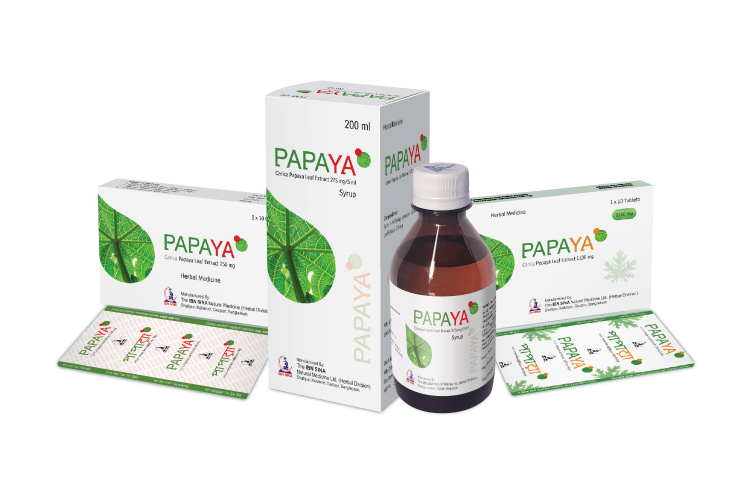
PAPAYA
CARICA PAPAYA LEAF EXTRACT
| NAME | STRENGTH | PACK SIZE | DOSAGE FORM |
|---|---|---|---|
| PAPAYA 250 MG | 250 MG | 20 S | CAPSULE |
| PAPAYA 1100 MG | 1100 MG | 10 S | TABLET |
| PAPAYA 275 MG/5ML | 275 MG/5ML | 200 ML | SYRUP |
Papaya Capsule: Each Capsule contains Carica Papaya Leaf Extract 250 mg.
Papaya Tablet: Each Tablet contains Carica Papaya Leaf Extract 1100 mg.
Papaya Syrup: Each 5 ml Syrup contains Carica Papaya Leaf Extract 275 mg.
Carica papaya (CP), belongs to the plant family Caricaceae, is an economically important fruit crop worldwide. Many scientific works have been carried out to evaluate the benefit of different parts of papaya plant including fruits, seeds, leaves, rind, shoots, roots or latex. The leaf is considered non-toxic as its lethal dose is >15 g/kg body weight.
Preclinical studies in mice demonstrated encouraging activity of CP powder in increasing platelet count. Recently in vitro study showed that CP leaves extract exhibited significant inhibition of hemolysis probably due to its membrane stabilizing potency.
Papaya is indicated for -
- Thrombocytopenia (low platelet count) associated with Dengue
- Thrombocytopenia (low platelet count) induced by chemotherapy
- Viral infections & upper respiratory tract infections
Papaya Capsule: The recommended dose of Carica papaya leaf extract (CPLE) 250 mg capsule is 1-2 capsules 2-3 times daily for five days.
Papaya Tablet: The recommended dose of Carica papaya leaf extract (CPLE) 1100 mg tablet is one tablet once/twice daily or as directed by the physician.
Papaya Syrup: 1-5 years: 1 teaspoonful (5 ml) 3 times a day for 5 days.
5-18 years: 2 teaspoonful (10 ml) 3 times a day for 5 days.
More than 18 years: 3 teaspoonful (15 ml) 3 times a day for 5 days or as directed by the physician.
Hypersensitivity, Pregnancy.
In males with prostate dysfunction, such as BPH or prostate cancer, C. papaya should be avoided as it increases the iron absorption. Excess iron may increase oxidative stress, especially in the aging male. Iron overload may increase the risk of developing prostate cancer.
Should be used with caution in individuals with bleeding disorders or those taking blood thinking medications such as aspirin or warfarin. Co administration of extracts of Carica papaya with oral hypoglycemic may lead to very low blood glucose as observed in one of the experimental animal study. Thus it is important to closely monitor the blood glucose levels regularly to avoid hypoglycemia.
Nausea, vomiting, abdominal pain, heartburn, dyspepsia.
Not recommended in pregnancy and lactation.
It has been found to increase the bioavailablity of amiodarone and therefore the dose should be adjusted accordingly when co-administered with Carica papaya leaf extract.
In vitro study demonstrated potentiating the action of various antibiotics like penicillin G, ampicillin, amoxyclav, cephalothin, polymyxin B, rifampicin, amikacin, nalidixic acid, gentamycin, cholarmphenicol, ofloxacin when co-administered with C. papaya. The extract of C. papaya with antimicrobial agents possesses synergistic properties which act against the pathogenic organisms.
N/A
Store below 30°C temperature, protected from light and moisture.
Papaya Capsule: Each box contains 2 x 10 Capsules in Alu-Alu blister pack.
Papaya Tablet: Each box contains 1 x 10 Tablets in Alu-Alu blister pack.
Papaya Syrup: Each bottle contains 200 ml Syrup with a measuring cup.
